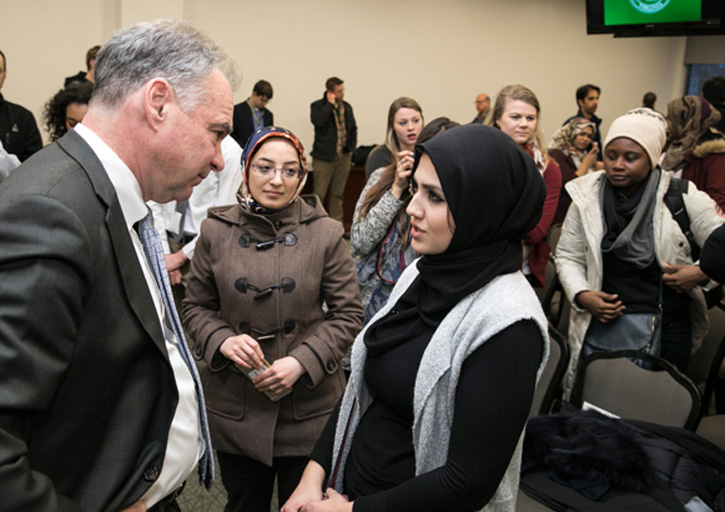
U.S. Sen. Tim Kaine speaks with Najwa Elyazgi a Libyan student studying international relations, who was banned from reentering the United States under President Donald Trump's executive order, at a meeting about immigration and access at the Fairfax Campus on Feb. 10, 2017. Photo by Ron Aira.
U.S. Sen. Tim Kaine met last week with George Mason University students affected by the White House executive order on immigration, hoping to learn more about how the proposed policy impacts universities.
Kaine, Virginia’s junior senator, spent much of the afternoon listening to George Mason students who come from seven countries listed in the executive order. He also provided the audience, which included students, faculty and staff, an update on where things stand in the immigration debate.
A federal judge issued a restraining order last week on the ban, which had set a 90-day block on entry to the United States for visitors from seven Muslim-majority counties. The 9th Circuit Court of Appeals upheld the restraining order.
“We want to be a country that has a university system that attracts the best and brightest from around the world,” Kaine told an audience of about 150. “We shouldn’t be chasing away people who are talented and saying you’re going to have to go exercise your talent somewhere else when you would want to stay here.”
Mason President Ángel Cabrera, a native of Spain who studied in the United States, introduced Kaine and several students who spoke at the event.
“Talent doesn’t care about what country you were born in or what religion you profess,” said Cabrera, who also noted that since 2000, immigrants have been awarded 40 percent of Nobel Prizes won by Americans in chemistry, medicine and physics.
Hadeel Al-Tashi, a graduate student from Yemen majoring in international commerce and policy, was one of the students in the audience.
“I built great friendships with students of different nationalities, including the seven banned countries,” said Al-Tashi, a member of Mason’s President’s Student Advisory Committee.
Kaine assured students that members of Congress will work to defeat policies that would hinder foreign students from pursuing their education in the United States.
“I think we all have a role in this,” he said, “and the role that we need to play is to be proud of the immigrant nation that we are and to discuss why the diversity of our society is not a weakness but a strength.”
